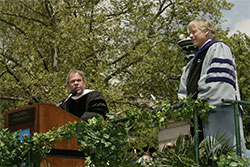TC and CU - Just Friends, or Something More?
Two years ago, TC made the exploration of those questions part of its strategic plan and, more recently,
The report paints a very clear picture of TC's strengths. On the academic side, the school boasts a growing enrollment, increasingly selective admissions and top-ranked programs in several areas, and a compelling new mission focused on educational equity. Financially, the school has been balancing its budget for 10 consecutive years, maintains an A1 credit rating from Moody's Investors Service (which was increased four years ago from A3), and boasts a sizable endowment of more than $160 million-'"resulting from a hugely successful and sustained capital campaign.
Yet as a stand-alone graduate institution, TC is more dependent on tuition as a source of revenue than other leading schools of education, has higher student-to-faculty ratios, and is seeking to boost its financial aid offerings. Meanwhile, academic costs are rising. The College has "limited -'degrees of freedom' to make material changes to the scale and mix of the college," the McKinsey report says.
TC and
So what could be changed and how might TC benefit?
One obvious route would be to create closer academic ties. At the simplest level, these might include allowing students to cross-register for courses, developing jointly hosted public lectures, enabling faculty-'"from both institutions on search and senate committees-'"to guest lecture, cooperating on research grant applications and increasing the number of joint appointments. More ambitiously, the two schools could combine certain programs, seek joint research grants, develop dual degrees and combined continuing education programs, develop shared summer institutes and collaborate on inter-disciplinary programs such as TC's Campaign for Educational Equity.
Students and faculty interviewed by McKinsey at both TC and
TC and
What about fully merging TC into
"The findings in the McKinsey report represent potential opportunities for cooperation that we wish to explore further," wrote Jack Hyland and Bill Rueckert, Co-chairs of TC's Board of Trustees, in a letter to the College community that accompanied the newly released report. "They are not recommendations for action."
To view the report, visit www.tc. columbia.edu/strategic-planning/Comments are welcome and can be expressed through the site.
Published Monday, Dec. 19, 2005
